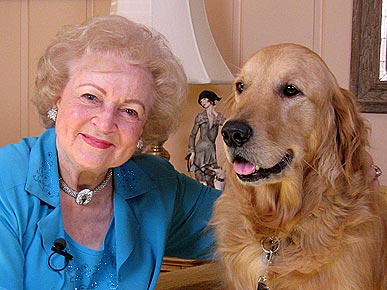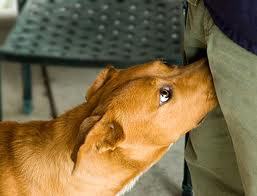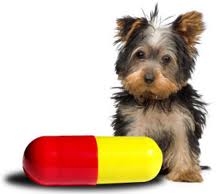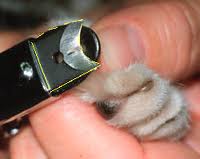
Animal Radio® Show #635
 A Dog's Mouth Is Not Cleaner Than A Human's
A Dog's Mouth Is Not Cleaner Than A Human's
A pet's saliva can miraculously cure human cuts and scrapes. These are common beliefs held by pet owners according to a new study. In fact, a dog's mouth often carries a variety of germs and bacteria that can make humans sick through contact with saliva.
What You Should Know About Moving
Planning on moving your furry family. Dr. Greg Neal of Morro Bay Veterinary Clinic is filling-in for Dr. Debbie. He has the information you need to relocate your dog, cat or bird.

Betty White Guests on Animal Radio®
She's back and better than ever. At 90 years old, who would of thought this actress spends more time helping the animals than she does acting.
 Pick Your Date with a Dog
Pick Your Date with a Dog
Wendy Diamond says your should pick your partner by the type breed dog or cat they own. She says if you want to start a family, choose a man with a mutt.
Listen to this Animal Radio® episode
Animal Radio® Show #634
 Microchip Reunites Human
Microchip Reunites Human
Microchips have been used for years to reunite pets with their humans. But in an extraordinary case, the chip was used to find the parents of a missing 3 year old child. Adam Goldfarb has the details of this miraculous recovery.
 Testicle Implants for your Dog
Testicle Implants for your Dog
There's lots of reasons people are making Neuticles so popular. The pseudo testicular implant is being used to return dogs, cats and horses to their original look after being neutered. Why can't we just perform a vasectomy on our pets just like humans? Dr. Debbie tells all.
Petscaping
Scott Cohen and Carol Doherty have penned the ultimate guide on making your yard and garden pet friendly. They have ideas to curb digging and making a special place for your furry friend outside.
 Bar Serves Beer To Dogs
Bar Serves Beer To Dogs
A bar in the United Kingdom is looking out for man's best friend. The Branding Villa has created a dog-friendly beer made of malt, hops, and meat extract. The bar has also created a dog-friendly menu, which includes chicken, eggs, and a Sunday roast that features "Cat" gravy."
Listen to this Animal Radio® episode
Animal Radio® Show #633
 Frankie Avalon Guests
Frankie Avalon Guests
Iconic singer Frankie Avalon loves his pets so much that at one time he had 20 dogs, cats and a goat. He's going on a cruise/tour and offering Animal Radio® listeners a special deal to personally join him.
Outdoor Cat Enrichment
Cats love the outdoors. But outdoor cats live on average 10 years less than their indoor counterparts. Cats on Deck's Jim Montgomery came up with the ultimate solution.
Employees Offer Pet Insurance
In an effort to keep employees happy, some companies are now offering discounted pet insurance. Firms such as S.C. Johnson, TD Bank and Travelocity provide discounted health coverage for workers' pets.
 Do You Have Bite Insurance?
Do You Have Bite Insurance?
Bite law has become so big that it is the bulk of Kenneth Phillips' law practice. He tells us why you need to have insurance if you have a dog.
Listen to this Animal Radio® episode

Animal Radio® Show #632
 My Cat From Hell
My Cat From Hell
Animal Planet's Jackson Galaxy is whispering to cats all across the nation. Can you really train a bad cat to be good? Rumor has it you can't train a cat at all!
Chicken Jerky Alert
Reports of illnesses in dogs given chicken jerky treats have spiked dramatically following a new government warning about pet snacks made in China. The FDA has logged at least 353 reports this year of illnesses tied to imported chicken jerky products, also sold as chicken tenders, chicken strips or chicken treats.
 Big Damn Float!
Big Damn Float!
Natural Balance makes another Guinness record with the longest and heaviest float in the Rose Parade. What makes a pet food company spend so much time on this once-a-year event? Joey Herrick is back to explain.
 Let Your Dog Sniff Out Your Date
Let Your Dog Sniff Out Your Date
If a man owns a Mutt, he is typically happy-go-lucky and will make a good mate, says Wendy Diamond author of How To Understand Men Through Their Dogs. Diamond offers up this advice for single women - "let your dog sniff out your date."
Listen to this Animal Radio® episode
Animal Radio® Show #631
 Did You Get Your Flu Shot? How About Your Dog???
Did You Get Your Flu Shot? How About Your Dog???
There has been an increase of dog flu in the northeast and Texas. The extent of the "outbreaks" and whether widespread public concern is warranted is unclear, because no central agency or institution monitors influenza in dogs. Clinical signs of flu in dogs are similar to those in people: runny nose, cough and fever.
Choosing the Right Pet Food
With many choices, brands and claims, it's never been tougher to find the perfect food for your pets. Dr. Debbie has a few suggestions for making that decision.
 Not A Hard Pill to Swallow
Not A Hard Pill to Swallow
How do you get your pets to take prescribed medicines if they taste bad? 75% of treatment failures in veterinary medicine are because of non-compliance. Enter Chris Simmons, top dog at the Professional Compounding Centers of America. He makes those nasty medicines taste like beef, chicken, or even strawberry, as one cat preferred.
 Clipping Your Pets Nails
Clipping Your Pets Nails
It needs to be done, but it's not as easy as you might think. The combined brain-power of the Animal Radio® Dream Team will make it easier for this ritual.
Listen to this Animal Radio® episode
Animal Radio® FREE Pets & People Drug Discount Card
SAVE NOW ON ALL UNINSURED MEDS!! For both you and your pet!
![]() You may already know how expensive pet medication can be. Especially when pet insurance doesn't cover drugs.
You may already know how expensive pet medication can be. Especially when pet insurance doesn't cover drugs.
All of us at Animal Radio® are doing our best to help out. After all, we're all in the same financial boat and don't want the pets to suffer because a medicine's cost is prohibitive. We made a deal with the top pharmacy benefits managers. Here's what we came up with:
- The Animal Radio® Pets & People Drug Discount Card is FREE.
- It offers 15-55% discount on pet medicines or uninsured human medicines.
- It's usable at almost 60,000 pharmacies, including Walgreens, Wal-mart, Rite-Aid, Target, Costco, CVS...all the biggies!
- Card is pre-activated and never expires.
- Great for small businesses that can't afford benefits for employees, or even your church or local Senior Center. We will gladly send you as many cards as you need.
- You can print out the FREE card online at: http://animalradio.com/Pets_People_Discount_Drug_Card.html
Or, if you would like us to mail you a free card, send a self-addressed stamped envelope to:
Animal Radio Drug Card
699 Paula Street
Morro Bay, CA. 93442
Please help spread the word. Your friends will thank you.
Print Your Free Drug Discount Card
Animal Radio® Headlines
Actress Betty White Guests on Animal Radio®
 (Los Angeles CA., January 27, 2012) Actress and animal advocate Betty White is a guest host next weekend on the nationally syndicated Animal Radio® show.
(Los Angeles CA., January 27, 2012) Actress and animal advocate Betty White is a guest host next weekend on the nationally syndicated Animal Radio® show.
The 90-year old Emmy winning actress claims that she's more active with the animals than acting. Her involvement includes sitting on the board of the Los Angeles Zoo and the Morris Animal Foundation.
It's clear that Betty loves all animals, but when asked if she is more of a dog or cat person, Betty states "I love anything with a leg on each corner" says Animal Radio® host Hal Abrams.
Betty says that her parents loved animals and they would often bring creatures home and ask her if they could keep them. She suggests we enjoy everyday with our animals. "Their roads are shorter than ours."
Catch this special national broadcast February 4th 2012, noon eastern on XM Satellite Radio channel 166 and 100 incredible AM-FM stations across the nation. Visit http://AnimalRadio.com to find a local affiliate.
Think a Dog's Mouth is Cleaner Than a Human's? Think Again.
NASHVILLE, Tenn., Jan. 16, 2012 /PRNewswire via COMTEX/ -- A dog's mouth is cleaner than a human's. A pet's saliva can miraculously cure human cuts and scrapes. These are common beliefs held by pet owners, according to a new study commissioned by The GREENIES® Brand, makers of the #1 vet-recommended pet specialty dental chews and treats. But veterinary dental experts urge pet owners not to believe so quickly, as many of these beliefs aren't necessarily true.
Among the most commonly held beliefs, the study found that almost half of pet owners believe that dogs' mouths are cleaner than a human's and that any type of chewing is good for a dog's teeth. It also found that about 40 percent think it is normal for their pets to have stinky breath. About one-third of pet owners believe that a dog's saliva can help cure human wounds.
"There is a lot of misinformation out there regarding a pet's oral health," said veterinary dental expert Dr. Jan Bellows, incoming president of the American Veterinary Dental College. "Dogs' mouths are certainly not cleaner than a human's. Dogs often carry a variety of germs and bacteria in their mouths that stem from buildup of plaque and tartar that can potentially make humans sick through contact with saliva. Many pet owners also believe that any type of chewing is good for their dogs, but tooth fractures are a common occurrence in pets because teeth can only withstand a certain amount of pressure from hard objects before they break. Pets chewing on inflexible items like bones, ice cubes or nylon toys are often in danger of tooth breakage. And while smelly breath in pets is common, pet owners who believe this is normal may be missing the signs of poor oral health or potential dental disease."
A healthy mouth is essential to the overall wellbeing of pets, but misguided information about pet oral health can affect more than just our pets' mouths. For proper pet oral health, veterinarians advise daily brushing or giving Veterinary Oral Health Council (VOHC) approved dental treats, and at least annual oral exams by a veterinarian with professional cleanings as recommended.
"Pet owners who are knowledgeable about their furry companions' oral health will avoid the pitfalls of commonly-held myths and enable the best care for everyone's wellbeing," said Dr. Bellows.

Get 25% off by entering "save25" in promo code box
 Ask the Animal Radio® Dream Team
Ask the Animal Radio® Dream Team
Listen to Animal Radio® LIVE every Saturday at noon eastern and Sundays at 5pm eastern on XM ch. 166 (America's Talk) or on any of the 100 AM-FM radio stations. Call with your questions toll-free 1-866-405-8405 or email yourvoice@AnimalRadio.com
Canine Pancreatitis
Susan: My 5 pound chihuahua was been very ill. Have finally gotten a diagnosis of pancreatitis. I've been giving her an IV once a day and syringe feeding her AD canned food. Her recovery has been very slow. The only thing Ive done differently with her (shes only 2 years old) is adding Stella and Chewy's (a little) to her kibble. Is raw food hard to digest? Could this have made her sick? I'm wondering if her appetite will ever return? Thanks for any thoughts and/or advice.
Dr. Debbie: Sorry to hear about your little one's bout with pancreatitis. It can be a tough disease and some pets can die from complications resulting from pancreatitis. I'd encourage you to treat her as aggressively as your personal situation and finances permit. My pancreatitis patients are admitted to the hospital for IV fluids, antiemetics, and IV antibiotics for any dogs with pancreatitis- not home care, until we are eating and no longer vomiting.
It worries me that you mention she is recovering slowly....Some dogs will go on to develop pancreatic abscesses or bile duct obstructions- these are very serious complications and need immediate hospitalization and treatment. Please be sure to speak with your veterinarian.
Also, I am concerned that you are feeding a/d right now- this is a very high fat content diet...the exact thing we should avoid during pancreatitis. A/d is nice that it is easily syringe fed, but otherwise not appropriate for the disease you are battling. See your veterinarian for some low fat diets that arre used for pancreatitis. The lowest fat canned food available is Royal Canin's prescription L/F diet with 16% fat on a ME basis. You can add water or even blenderize it to a smoother consistency if you need to syringe food to her.
Back to your original question...diet can play a role in causing pancreatitis for some dogs, but I have had others that just develop pancreatitis "for no good reason". I've seen pancreatitis occur in dogs that eat only a few bites of steak, newly introduced foods, those that get into garbage cans, and some with a recent diet change. The biggest issue tends to be the level of fat in the food, and if the individual pet has a low tolerance for fat.
It will be crucial after recovering from pancreatitis that we avoid any high fat sources of nutrition because reoccurrences of pancreatitis are common. That means no soft treats, no people food, and I suggest a prescription diet that has 15-20% fat based on Metabolizable Energy (ME). Be sure to compare % fat ME ...you cannot compare this figure interchangably with % fat AS Fed or Guaranteed minumum Crude Fat %.
Other prescription diets appropriate for pancreatitis include Royal Canin LF, Hill's i/d and Purina's EN.
Sorry for the long reply- you are dealing with a complicated disease here. Get her off the a/d and in to the vet for a recheck visit asap!
Litter Box Problems
Kelly: I have a 2 year old neutered male cat that all of a sudden stopped using the litter box. I took him to the vet and he had a fever and the vet gave me some Amox for him and he got better. He will still only use the bathroom in the kitchen. If I move the litter box into the kitchen he will use it. If I move it right outside the kitchen he will go back to using the bathroom on the kitchen floor right in front of the door that leads outside. He has always been an inside cat. I've tried slowly moving the litter box out of the kitchen but as soon as it is outside the kitchen he will go back to using the floor. The vet saw no signs of crystals or a UTI and he is acting and eating normally. I could just give in and leave the litter box in the kitchen but I really don't want it there. Any suggestions or advice? Please help. There is another 2 year old neutred male cat in the house as well and they get along but he will use the litter box no matter where I put it. Both cats have been indoor cats since they were small. Thank you for your time and help.
Dr. Debbie: You mention that your kitty got better on the antibiotics-but what signs was he initially displaying? If he actually had pain or straining from an infection- he may now be associating that pain with the litter box ANYWHERE else BUT the kitchen. This is when a medical problem may be resolved, but it then becomes a behavioral issue. Just the memory of pain in the litter box can keep a cat away from the site it happened.
I would suggest getting a piece of linoleum large enough to create a border around your litter pan by 1-2 feet. Then place a litter pan on top of the linoleum inside the kitchen- let him use this for a 2 weeks or so. Then gradually move it to outside the kitchen. The linoleum is to mimic the flooring in your kitchen- so that when it is moved elsewhere it gives him the sense he is using the kitchen location. With time after successful use of box in other rooms, then we make the goal or removing the linoleum.
In the meantime I would ensure you offer 2 other litter box sites in the house in areas where the boxes have not previously been. It is important to not return the boxes to the exact same sites as before. Take off any litter box covers, scoop the boxes daily, and change the litter regularly. It helps to use the product Cat Attract as a litter box additive.
During this time I suggest using a cat pheromone product like the Feliway plug-in diffuser in the immediate environment. Pheromones can help to ease anxieties in a natural way. I would only consider anti-anxiety medications if your additional efforts do not help. Give these steps a try- we are working on kitty psycology!
Hope that helps ya some!

Get a Stella & Chewy's Sample - Lowest prices Online!!
Urethral Blockage in Male Cat
Rachael: I have a sick male cat named Max who is 18 years old and otherwise in good health. My poor cat has been off and on a catheter since last Tuesday (a week). The vet is stumped as to what is causing his inability to urinate. She has tried every avenue she can think of including steroids and valium and now wants to amputate the end of his penis. The vet started him on an aggressive drug last night (phenoxybenzamine) and if that doesn't work by the end of today they want me to make a decision on whether to go ahead with surgery or not.
Like most people who have pets, I'm willing to do just about anything to keep him alive. This situation is tough because he's not physically sick, he just can't pee. I can't afford the surgery on my own but I will find a way if that's the last resort. I'm desperate to find a solution without having to perform the surgery, which is not a guarantee that the problem will be resolved. I appreciate any help you can provide!
Dr. Debbie: Oh my heart goes out to Max- urinary obstructions in male cats are complicated medical conditions, are very painful for the kitty, and can reoccur. Max is a bit unusual in his 18 years of age- most cats develop this at a younger age. A urinary blockage is a life-threatening emergency that is more common in male cats- their urinary open tapers to a smaller diameter in the penile area and is prone to this more than in females. Urinary blockage can occur from crystals/stones, mucus plugs, tumors, or severe urethral inflammation. Kidney failure may develop in blocked cats as toxins build up in the system. Urinary obstructions can be fatal within a few days if untreated!
Symptoms of lower urinary tract blockage include: vomiting, not eating, passing bloody urine, straining to urinate, urinating out of litter box, and licking penis area. Spending a lot of time in litter box or seeing drops of urine can be a signal that a male cat may be obstructed!
Typically treatment of blocked cats starts with catheterizing and un-obstructing the urethra under general anesthesia since these kitties are very painful. A urinary catheter is left in place, Intravenous fluids are given, antibiotics are started, and medications are given to control pain and relax the urethra.
It sounds like your vet has already used many of these remedies. If no grit/stones are currently blocking his urethra, he may have severe swelling in the urethra, which can still block his urine flow. It can take several days to see if phenoxybenzamine will allow the urethra to open up. When all these medical avenues have failed to correct the problem- then I agree that surgery should be considered.
The surgery your vet is referring to is a Perineal urethrostomy (aka :PU) and the goal of the procedure is to open the urethra at a level where it is much wider. And yes, this means that the end of the penis is amputated. Try not to focus on this surgery as just "cutting off the penis" it'll just freak you out- it can be a life-saving surgery when no other options remain. There are some potential complications with this surgery such as stricture (scarring of the opening), nerve damage, and a higher rate of urinary infections in the future. A PU surgery isn't cheap and can be technically challenging...but if Max is in good health, then I would definitely consider surgery for this little guy. My best wishes go out to you and Max!
Surgical Reaction?
Jenna: I have an 11 month old Mini Schnauzer. She was spayed in July of last year (2011). From the spaying she developed a pea size scar tissue right where the suture was. I had her checked out by her Vet then, who claimed that scar tissue around that area is normal, so I didn't think much of it. Then two night ago (6 months after surgery) I noticed that the pea sized scar tissue had swollen to maybe 4 times its size and was RED. I immediately rushed her to emergency. The Vet at emergency said that she did not have a hernia, but it was indeed an allergic reaction to her surgery from 6 months ago. He injected her with cortisone and prescribed her a topical anti-itch cream. At that time, my little Huckleberry was not really displaying any signs of illness, so I took her home. She had although vomited the day before (Thursday.) The next day (yesterday morning) I drove her to her veterinarian and she pretty much told me the same thing as the Vet from the night before. Her vet also prescribed her some antibiotics. The only problem is that my lil Huckleberry is lethargic now and is not really eating very much. Her vet told me to give her a 2 part boiled rice and one part cottage cheese mix, and I think Huck just does not like it. I am just concerned that this could be a more serious problem and the vets are just not aware??!! Have you heard of spay sutures becoming inflamed after 6 months from the surgery, and if so, what advice do you have for me and should I get a third opinion??
Dr. Debbie: It is definitely possible that a pet can develop a suture reaction at a surgical site even after this time frame. A suture reaction occurs when the body develops an exaggerated inflammation response to suture material...almost like the body is trying to reject the suture material. I find that some dogs recover just fine with some time, antiinflammatories, and antibiotics. Only rarely do I have to go back in and do surgery to remove the suture material.
Since 2 vets got a look at this and don't think it's a hernia, that should make us more comfortable.
Her lethargy and lack of appetite could certainly be from the antibiotic. Many types of antibiotics are best given with food to minimize tummy upset. The cortisone shot could also make her feel a bit off too. If those symptoms continue then I'd see your vet.
If a pet tolerates it, a warm compress to the area can help a bit with soothing inflammation. Hope that her belly is feeling better soon!
Listen to the Animal Radio® Dream Team


Celebrate your pets right now at AnimalRadio.com
Get Animal Radio® Headlines emailed to you, or catch us on ![]() Twitter and
Twitter and ![]() Facebook.
Facebook.
"Like" Animal Radio® on Facebook - and win goodies for you and your pet.
Copyright 2003-12 Animal Radio®, its logo and Animal Radio Network(TM) are registered trademarks of Animal Radio Network LLC. All rights reserved. Submissions for newsletter, programming, editorial comments and opinions may be sent to: YourVoice@AnimalRadio.com. See our website for additional information.




